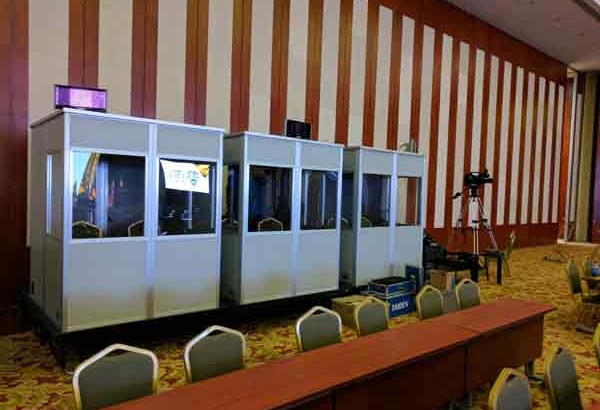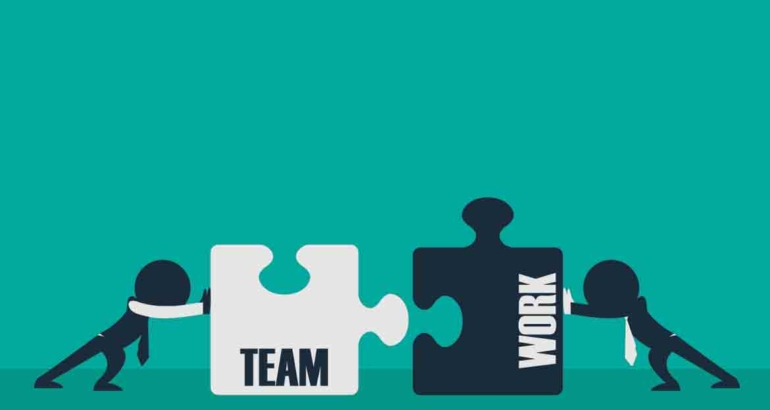The answer is YES!
The equipment for consecutive interpreting is often overlooked by event organizers. It is indeed necessary. In consecutive interpreting, interpreters need to project their voices. This can put strain on their vocal cords especially when projecting for extended hours. Microphones can help with the voice projection and reduce interpreter fatigue.
Compared to equipment for simultaneous interpretation, equipment for consecutive interpretation is less costly, but still an essential part of the meeting planning. See Equipment: Simultaneous Interpretation.
What equipment is needed for consecutive interpretation?
Microphones are required for consecutive interpretation. There are two types of microphones that are commonly used: tabletop and lapel.
Tabletop microphones
Tabletop microphones are stationed on the table and allow for hands-free operation.

Tabletop microphones for consecutive conference interpreting
Lapel microphones
Lapel microphones are portable microphones that are usually pinned on the lapel and allow for hands-free operation. They also allow the speakers to move around.

Lavalier microphone for consecutive conference interpreting
Speakers should be equipped with microphones.
Speakers may use tabletop or lapel microphones.
Speakers who speak from a podium or sit at a table may use tabletop microphones. Speakers who move away from the podium or who sit on a panel should wear lapel microphones.
Interpreters should be equipped with microphones, too!
Ideally interpreters should be equipped with lapel microphones so that they can free their hands (they must free their hands since they do need both hands for note-taking) AND they can move around if necessary for a better listening, for example, when the acoustics is not great.
If every person who speaks (including the audience in the Q&A session) has access to a microphone, then tabletop microphones for interpreters are acceptable.
Specific settings and the equipment needed
Below are some specific settings:
Court interpreting (if consecutive interpreting)
Interpreters: use tabletop microphones.
Attorneys, parties and witness: use tabletop microphones.
Note that not only the interpreters’ voices need to be recorded, the parties and the witnesses’ utterances need to be clearly recorded, too.
Deposition interpreting
Interpreters: wear lapel microphones.
Attorneys: wear lapel microphones.
Deponents: wear lapel microphones.
Again, not only the interpreters’ voices need to be recorded, the witness’ utterances also need to be clearly recorded (although they are not in English).
Roundtable discussions (if consecutive interpreting)
Interpreters: wear lapel microphones.
Attendees: each has a microphone in front of them. If not everyone has a microphone, then one or more wireless microphones should be circulated so that all who speak can speak into a microphone.
If attendees do not have access to microphones, then interpreters must be equipped with lapel microphones so that they can walk around in order to be close to whoever speaks (some speakers speak softly).
Panel discussions (if consecutive interpreting)
Interpreters: wear lapel microphones.
Panelists: wear lapel microphones.
Seminars, workshops, and courses (if consecutive interpreting)
Interpreters: have a table top microphone or wear a lapel microphone.
Seminars, workshops and courses are usually held in classroom settings. Some clients may take it for granted that the interpreters do not need any microphone because the lecturer can speak without a microphone for a whole semester. However, interpreters are not just speaking for one or two hours; they will be speaking for a full day, a whole week, or weeks. Microphones help interpreters effectively protect their voices and reduce fatigue.
Therefore, it is essential that meeting planners take into consideration the necessary equipment for consecutive interpreting.
If you have questions regarding the consecutive interpreting equipment, and your meeting type is not listed above, please feel free to contact us for a free consultation.


